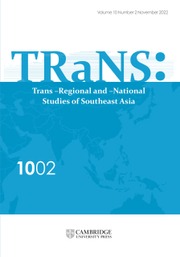No CrossRef data available.
Muslim Women Against Feminism: The Family Love Alliance (Aliansi Cinta Keluarga) and Its Impact on Women's and Sexual Rights in Contemporary Indonesia
Published online by Cambridge University Press: 10 July 2023
Abstract
This article discusses how Islamic conservatism has affected public discourse and policymaking on gender and sexuality and its impact on the struggle for gender equality and sexual rights in contemporary Indonesia. It particularly seeks to examine and analyse how Muslim women in the Family Love Alliance produced a counter-discourse against feminism in their struggle to oppose the ratification of the sexual violence eradication bill. While research on Islam and gender in Indonesia has primarily focused on Islamic feminism, little research has addressed the counter-discourse against Islamic feminism produced by Muslim women and how this might influence ideas of and advocacy for women's rights and gender equality. Some scholars on Indonesian Islam have also argued that rising Islamism has turned the country more religiously conservative. However, scholarly understanding of the relationship between Islamic conservatism and gender remains limited. Drawing on my fieldwork in 2018 and 2019 and informed by social movement theory, this study captures how AILA women activists represent a conservative Islamic backlash against gender equality movements in contemporary Indonesia's public sphere.
- Type
- Original Article
- Information
- TRaNS: Trans-Regional and -National Studies of Southeast Asia , Volume 12 , Issue 2 , November 2024 , pp. 156 - 172
- Copyright
- Copyright © The Author(s), 2023. Published by Cambridge University Press on behalf of Institute for East Asian Studies.



